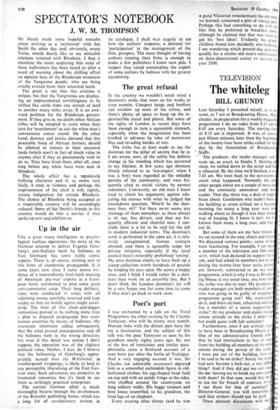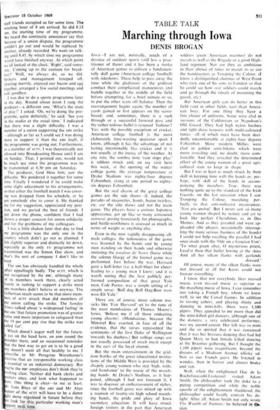TELEVISION
The whiteleg
BILL GRUNDY
Last Saturday I presented myself, as is my wont, at 7 am at Broadcasting House, Man- chester, in preparation for a weekly magazin programme I do on radio from 8.15 am to 8.45 am every Saturday. The starting tim of 8.15 am is important. It was, of course just fifteen minutes later than the beginnin of the twenty-four hour strike called for tha day by the Association of Broadcastin Staffs.
'9' The producer, the studio manager and went up, as usual, to Studio 5. Shaking o sleep, we settled down to the script and ha a rehearsal. By the time we'd finished, it w 7.45 am. We went back to the newsroom t await what happened. Normally the onl other people about are a couple of news st and the continuity announcer and nea reader. That day there was a deal of toppis brass about. Gentlemen who hadn't been the building at seven o'clock on a Saturda morning for many a long year were no walking about as though it was their norm way of keeping fit. I know it isn't. for rs, known them many a long year, and they not fit.
But some of them are my best friends, we sat around in the easy chairs and chart We discussed various points ; some of the were fascinating. For example, I am mys a member of the television and film unio Acrr, which had declared its support for ABS, and had asked its members not to wo during the twenty-four hour strike period. am, however, contracted to do my wee programme, which is why I was at Broadc ing House at my usual time, one hour bef the strike was due to start. My producer studio manager are both members of ABS. who was going to be guilty of stopping programme going out? Me, contracted do it, and there on time, rehearsed and re but a member of a union supporting strike? Or my producer and studio manaf whose attitude to the strike I didn't La but could guess with fair certainty? Furthermore, once 8 am arrived, ough to have been in Broadcasting House at a One of my administrative friends told that he had instructions to bar or rem from the building all members of the stn unions during the period of the strike I were put out of the building, how co. I be said to be on strike? Surely the situati had now become a lock-out, a very differ thing? And if they did put me out. we' the BBC forcing me to break my own cow with them? In that case, would they be t to sue me for breach of contract, or c I sue them for loss of earnings? Director-General, you will remember. said that strikers should -not be paid.
These pleasant discussions with my
staff friends occupied us for some time. The witching hour of 8 am arrived. So did 8.15 am. the starting time of my programme. We heard the continuity announcer say that because of a union dispute, the programme couldn't go out and would be replaced by another, already recorded. We went on talk- ing until 8.45, by which time my programme would have finished anyway. At which point we all looked at the clock. 'Right', said some- one. 'Coming up to the canteen for break- fast?' Well, we always do, so we did. Strikers and management trooped off, chatting merrily, enjoyed our bacon and egg together, arranged a few social meetings and said goodbye.
I was due to do a sports programme later in the day. Round about noon I rang the producer—a different one. 'What's the state of play?' I asked. 'Oh, we're doing the pro- gramme, quite definitely,' he said. 'See you in the studio at the usual time.' I indicated that there was a slight difficulty. I was a member of a union supporting the ABS strike —although as far as I could see I was doing more to support it than the ABS itself, if the programme was going out. Furthermore, as a member of Acrr, I was theoretically not allowed into Broadcasting House until 8 am on Sunday. That, I pointed out, would not be much use since the programme was to be transmitted at 6.30 pm on Saturday.
The producer, God bless him, saw the difficulty. We pondered it together for some time. Finally I wondered if he could make some slight adjustment to his arrangements, so that either the football match I was cover- ing was dropped from his schedule, of he got somebody else to cover it. He thanked me for my suggestion, appreciated my posi- tion, and we parted the best of friends. I put down the phone, confident that I had shown a proper concern for union solidarity and for the problems of my colleagues.
I was a little shaken later that day to find my programme was the only one in the country which didn't go out as planned. I felt slightly superior and distinctly let down, especially as the only ry programme not transmitted was the Simon Dee show, and that's the sort of company I don't like to keep.
The ABS has obviously handled the whole affair appallingly badly. The Acrr, which is not recognised by the BBC, although many of its members work there, clearly acted hastily in rushing to support a strike most Bs members didn't believe in anyway. The Gilbertian result seems to be that more mem- bers of Acrr struck than did members of he union calling the strike. The Sunday rules talked about 'a widespread feeling' in he ABS 'that future promotion was of greater
alue and more important to safeguard than he 10 per cent pay rise that the strike was ailed for'.
Which doesn't augur well for the future. pat on the head here, an arm round the houlder there, and an occasional reminder
hat the best way to get on is to be a good y doesn't seem all that healthy to me. I ubscribe to Mr Peregrine Worsthorne's
octrtne that an irresponsible working class essential to an industrial democracy. But taybe the BBC employees don't think they're orking class. Neither did bank clerks and achers once, and look what happened to em. One thing is clear—to me at least.
r Tom Rhys of the ABS and Mr Alan apper of the Acrr will have to be a damn ght more organised in future before they n look for this particular working man's PP0rt next time.



































 Previous page
Previous page